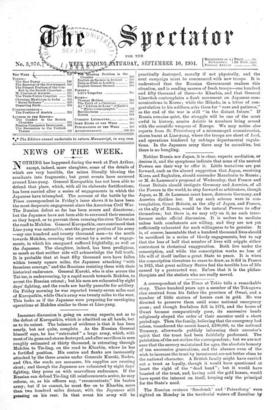A correspondent of the Times at Tokio tells a remarkable
story. Three hundred years ago a member of the Tokugawa clan received from his father the province of Owari, and a number of little statues of horses cast in gold. He was directed to preserve them until some national emergency arose ; and though feudalism fell in 1874, and the house of 0 wari became comparatively poor, its successive heads religiously obeyed the order of their ancestor until a short period ago. Then the family, believing that the emergency had arisen, transferred the secret hoard, 2100,000, to the national Treasury, afterwards publicly informing their ancestor's spirit that the trust had been faithfully performed. The patriotism of the act strikes the correspondent; but we are not sure that the secrecy maintained for ages, the absolute honesty of ten successive generations, and the absence even of the wish to increase the trust by investment are not better clues to the national character. A British family might have carried out a trust as loyally, though it would have questioned at heart the right of the "dead hand" ; but it would have boasted of the trust, and, having sold the gold horses, would have spent the interest on itself, keeping only the principal for the State's need.


































